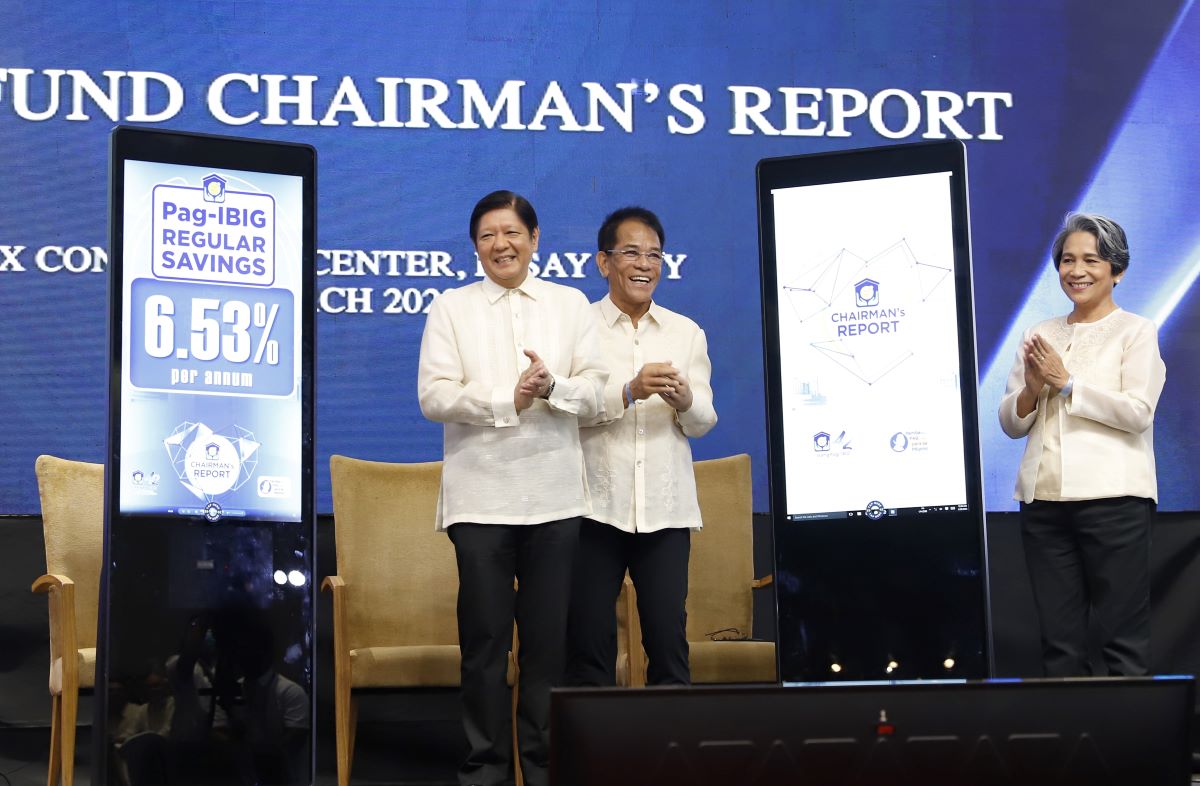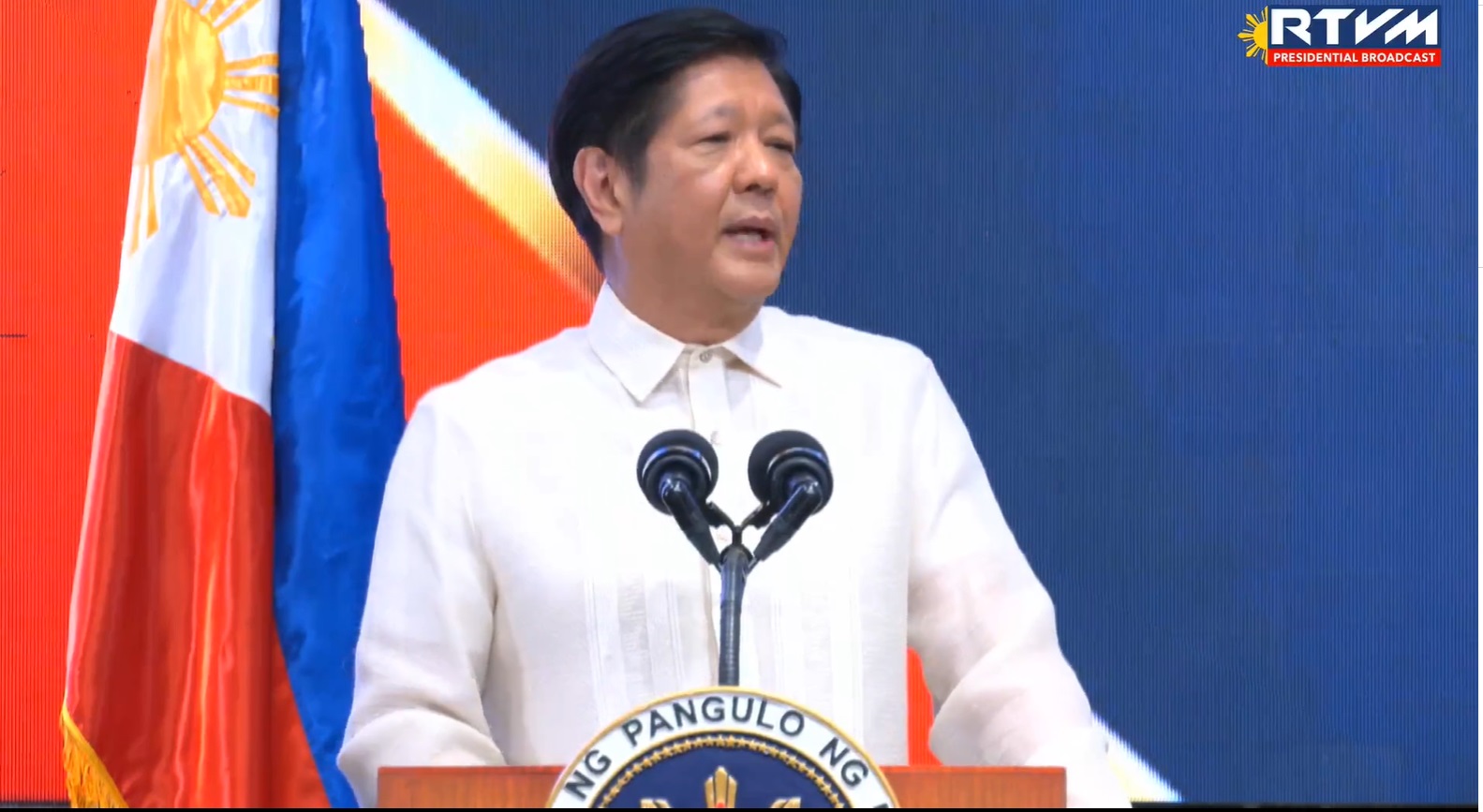PRESIDENT MARCOS: ... taon nakita naman natin na ‘yung Pag-IBIG Fund self-sustaining talaga. Hindi lamang self-sustaining kung hindi nakita naman natin ang laki-laki na.
Ang dami ng miyembro, 2.6 million members. Ang naging income nila is 44 billion, 42 billion ang dibidendong naibigay nila.
Kaya’t makikita niyo maganda talaga ang performance ng Pag-IBIG Fund. Kaya’t sinasabi ko sa kanila dapat ipaalam natin sa taong-bayan na ‘yung Pag-IBIG Fund ganito ang naging performance para naman malaki ang tiwala nila na masasabi natin ‘pag nilagay ninyo ‘yung pera ninyo diyan talagang lalaki ‘yan at hindi magkakaproblema, hindi mawawala ‘yung savings ninyo at saka ‘yung investment ninyo.
So I think the record, the Chairman’s Report that we heard today speaks for itself and that will – but we will... Beyond the report that we heard this afternoon, we will explain to the public what Pag-IBIG is for and how it has performed over the last 42 years and to give them the confidence to save and to invest with the Fund.
Q: Thank you, sir.
PRESIDENT MARCOS: Thank you.
Q: Good afternoon, sir.
PRESIDENT MARCOS: Hello. Good afternoon.
Q: The senators are calling for government to have a comprehensive plan to address an impending water crisis, especially now that El Niño is underway. What are your marching orders, sir, especially with the Department of Agriculture, since we are also expecting an impact on irrigation and might eventually impact on food supply? Thank you.
PRESIDENT MARCOS: They may not have heard the fact that we have organized already the Office of Water Management precisely to address this problem of...
In fact, I was – just recently, I spoke on precisely this subject on what were the elements that we really have to get into place because we have a serious – never mind, kalimutan na muna, isantabi muna natin ‘yung El Niño, kahit walang El Niño may problema talaga tayo sa tubig.
And I’m talking about fresh water supply, drinking water, irrigation water. Ito lahat ay kailangan natin talagang tingnan. So what we have come up with the – well we have an overall plan in that we are changing the way that we water, that we acquire the supply of water and we are hoping to shift – we’re not hoping, we are going to shift from the majority of water sources now which is kumukuha tayo, laging balon ang kinukuhanan natin eh. We always dig wells. Whereas, what we really should be doing is taking advantage of surface water. So that’s one element.
And secondly, ‘yung mga infrastructure, mga flood control, mga irrigation, siyempre ‘yan lahat ‘yan talagang binigyan natin ng diin para mas maging maganda.
Dahil basta sa agrikultura naman, alam naman natin ang pinakamahalaga para makakita ng magandang produksyon ay ang patubig. At ‘yan ang titingnan natin. We have already identified, in terms of rice production, we have already identified certain varieties, hybrid varieties especially, that do very well during the dry season.
So pinapalit-palitan natin ‘yung variety para to take advantage of the different qualities of the different varieties, especially – not only of rice but also of the high value crops dahil ‘pag dry season usually ‘yung ibang lugar na hindi nag-aalaga ng – nagtatanim ng palay ay high value crops ang kanilang tinitingnan.
So those are the measures that we have already put into place specifically for the Department of Agriculture.
But again, the water management problem that we have in the Philippines goes beyond – because it’s water – it goes beyond just agriculture. Of course, agriculture is an extremely important part of it but we are talking about irrigation – water for irrigation, water for power production, our management of surface water sa flood control and for irrigation as well.
All of these things we have already put up together – we have already [put] together [an] overall plan. Now, we have to implement it because we have to put together...
There are many agencies that are concerned when it comes to water management. So we have to make it more cohesive. That’s why nagtayo tayo ng Office of Water Management, which presently will be attached to the Office of the President and with DENR.
But we are hoping down the road, mayroon ng mga bills that have been filed in the legislature, in both houses, na itinatayo ang Department of Water Management, and that’s precisely what we are trying to face.
We already have a problem but then there’s now the new factor or not-so-new factor of climate change that we really have to deal with.
The good thing is that we have seen many examples of water management around the world which we can emulate. Puwede nating gayahin dito sa Pilipinas, bagay dito sa Pilipinas. Kasi naman hindi natin siguro dapat...
Mahirap… Hindi katanggap-tanggap na ang Pilipinas kulang sa tubig. Dahil alam naman natin hindi – basang-basa ang Pilipinas na ano eh. We are a tropical country.
And so it’s just really a question of managing our water. We have always – we kept postponing this problem over the many, many years at every level. So it’s time to put it together, to put in a cohesive plan na masusundan ng lahat ng LGU, masusundan ng lahat ng mga agencies of government.
Q: Thank you, Mr. President.
PRESIDENT MARCOS: Thank you.
Q: Hi, sir. Magandang hapon po. Sir, the International Criminal Court rejects the appeal of the Philippine government to suspend the probe on drug war in the country. May we have your thoughts on this? Ano pong masasabi ninyo? Ano po ‘yung next move natin?
PRESIDENT MARCOS: We don’t have a next move. That is the extent of our involvement with the ICC. That ends all our involvement with the ICC because hindi na tayo puwedeng mag-appeal. The appeal has been – the appeal has failed. And there’s – in our view, there is nothing more that we can do in the government.
And so at this point, we essentially are disengaging from any contact, from any communication I guess with the ICC. We are back to the position that we... We ended up with the same position that we started with and that is we cannot cooperate with the ICC considering the very serious questions about their jurisdiction and about the – what we consider to be interference and practically attacks on the sovereignty of the Republic. So that’s pretty much it.
We have no longer any recourse when it comes to the ICC. We have not been involved with the actual action. Merely as a comment, we would comment, and the appeal is part of a comment. But we have not appeared as a party in the ICC because we do not recognize the jurisdiction of the ICC.
And so that is again, as I said, we have ended up now at the end where we really started.
All right. Thank you.
--- END ---



